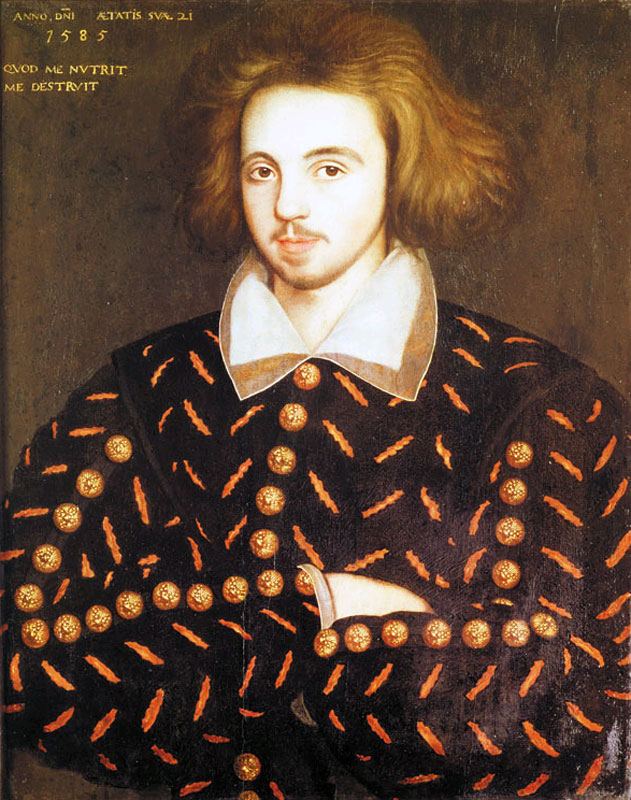Christopher Marlowe

Marlowe was born on February 6, 1564, in Canterbury. Marlowe was the son of a wealthy Canterbury shoemaker who was an influential citizen in his community. After attending King’s School in Canterbury, in 1580 Marlowe went to Corpus Christi College in Cambridge. He attended the college on a scholarship founded by Archbishop Parker, which was granted for six years to those studying for a career in the church.
Marlowe received his B.A. in 1584, and three years later he received his M.A. degree. His academic career was fairly conventional except for some long periods of absences during his second year. The only trouble Marlowe encountered, were just before he was granted his M.A. degree. Due to the prevalence of certain rumors, the college intended to hold up his degree. Subsequently the Privy Council of the queen, wrote a letter to the university reassuring the college regarding Marlowe’s character and reaffirming that he had been of service to her majesty. The purpose of this letter was to dispel rumors that Marlowe planned to join the English Catholics at Reims in France. Marlowe appears to have performed services for the government during these years, such as carrying dispatches overseas or else acting as a spy in the service of Sir Francis Walsingham, who was the head of Queen Elizabeth’s secret service. No direct evidence however has been found to confirm the nature of his services to the queen.
After receiving his M.A. from the university, he moved to London, where he was part of a brilliant circle of young men which included: Rawley, Nashe, and Kyd. For the following six years of his life after he had left the university, he mainly lived in the theatrical London district of Shoreditch. Although he traveled a great deal on government affairs during this time, he always retained this London address. For a time, he had as his roommate Thomas Kyd, who is also the author of a very popular Elizabethan play, The Spanish Tragedy. Kyd later stated that Marlowe had a violent temper and a cruel heart. In September of 1589, Marlowe was imprisoned in Newgate for his part in a street fight in which William Bradley, the son of a Holborn innkeeper, was killed. One of Marlowe’s friends by the name of Watson had actually killed the man with his sword, therefore Marlowe was not charged with murder himself. Further testimony to his violent temperament came three years later, when in 1592, Marlowe was summoned to court for assaulting two constables in the Shoreditch district. In the spring of 1593, Marlowe again found himself in difficulty with the Privy Council on the charge of atheism and blasphemy. Then, twelve days later, Marlowe was killed in a tavern in Deptford, a dockyard adjacent to Greenwich. On that day Marlowe had accepted an invitation from Ingram Frizer, to feast at the tavern with several other young men of dubious reputation who had been involved in swindles, and spy work. After supper, Marlowe got into an argument with Frizer over the tavern bill. When Marlowe struck Frizer on the head with a dagger, Frizer twisted around somehow and thrust the dagger back at Marlowe, striking him on the forehead and killing him instantly. During his short career as a dramatist, Marlowe gained a significant reputation basied on four dramas. Other than his first play, Tamburlaine, he is renowned for his play Faustus, composed between 1589 and 1592.
